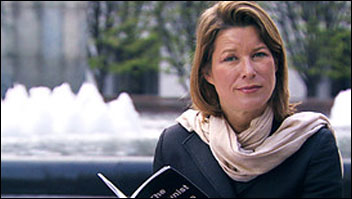TV review : Masters of Money: Karl Marx
Andy Beadle and Steve Glennon

BBC Two: Masters of Money: BBC Economics Editor Stephanie Flanders examines one of the most revolutionary and controversial thinkers of all: Karl Marx, photo BBC
Stephanie Flanders concluded her BBC TV series Masters of Money by looking at Karl Marx, “capitalism’s severest critic”. Often “refuted”, his ideas just won’t go away!
The deep crisis of recent years and their lack of answers has led some economists to read for themselves what he really said.
Former International Monetary Fund chief economist and now a University of Chicago professor, Raghuram Rajan, said Marx was right on a number of dimensions including social inequality.

Karl Marx
The senior economic advisor at UBS, George Magnus, said: “Anyone from Chelsea or Chelmsford who thinks Marx is only about communism is in for a shock because it is what Marx said about capitalism that rings so true today.”
Flanders commented: “Marx said capitalism is inherently unstable and would lurch from crisis to crisis and society would become increasingly unequal”.
Marx saw capitalism as fundamentally flawed: the problem wasn’t how to improve it but to replace it with a new type of society.
He saw how different forms of society – like slavery and feudalism – had been overthrown when they no longer enabled economic progress. Capitalism isn’t eternal either.
The programme showed Marx developed a comprehensive analysis of the shortcomings of the profit system while it was still in its infancy. But it repeatedly claimed he said little about what could replace it.
In fact Marx spent much of his time trying to build and unite the workers’ movement. He followed international developments and commented on strategy and tactics.
In this programme, Marx’s followers were shown to be academics: Martin Jacques, former editor of Marxism Today, professor David Harvey, City University of New York, Tariq Ali, New Left Review, and New Labour MP Tristram Hunt.
Comments also came from former Tory chancellor Nigel Lawson and Bank of England Governor Mervyn King.
But nothing from “the 99%”: those who suffer the personal consequences of debt, poverty and unemployment, who are increasingly moving into struggle, as Marx predicted.






